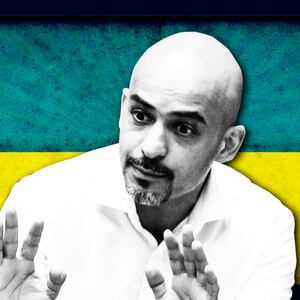MOSCOW–Ukraine knows Volodymyr Zelensky for his political satire, sharp comic performances and a TV series, Servant of the People, where he plays the country’s president in preposterous situations. Yet the comedian-turned-politician seems to be growing more serious by the day.
Last Sunday, Zelensky won big in the first round of Ukraine’s presidential elections with a commanding 30 percent of the votes. That put him well ahead of the current president, Petro Poroshenko, who has led Ukraine through five hard years of Russian hybrid war but barely secured second place with only about 16 percent of the vote.
Zelensky’s critics warn that, as president, he won’t be able to hide behind his jokes, and hope a majority of voters who supported 37 other candidates in the crowded field will decide in the run-off on April 21 that Ukraine needs a serious leader to address serious problems.
Right now, thousands of Ukrainian soldiers continue fighting to defend their homeland from Moscow-led rebel forces controlling the Luhansk and Donetsk regions known collectively as Donbas. In the still-simmering conflict, more than a dozen Ukrainian soldiers died in the past month, including two killed by mortar fire just as Ukraine was discussing Zelensky’s first-round electoral victory.
Unlike in Russia, where the election results are always predictable, Ukraine strives for real democracy, and nobody can tell now who will win: the inexperienced 41-year-old Zelensky, who has no clear political program, or the incumbent, 53-year-old Poroshenko, who has disappointed many.
The Daily Beast spoke with public leaders from across Ukraine about their expectations.
Galina Odnorog, a courageous volunteer from Mariupol on the Sea of Azov, says she likes Zelensky. Odnorog remembers that at the beginning of the war back in 2014, Zelensky and his comedy troupe performed for soldiers in Mariupol. “It was a pure patriotic initiative from his side,” said Odonorog. “He did not have any hidden agenda to become a politician.”
These days, Ukrainians are savoring the prospect of a possible debate between Poroshenko and Zelensky at Kiev’s 70,000-capacity Olympiyskiy stadium. In a YouTube video, striding onto the pitch at the arena like a lion across the savanna, the showman Zelensky laid down his terms for Poroshenko.
For starters, the debates should be as public as possible, with access for all interested journalists. He also demanded that, in advance, both candidates have drug tests–an area in which, weirdly, both candidates are trying to one-up each other.
On Friday, Poroshenko had his blood, urine and hair tested for drugs and alcohol, while Zelensky has only had his blood tested.
“During the [first round] election campaign Poroshenko’s fans accused Zelensky of snorting drugs, but Zelensky did not insult any other candidates in revenge,” said Odonorog. “He seems to be consistent, but before I give my vote to him, I should see who he chooses for his team.”
While deadly mortars explode in Donbas, Kiev is bubbling with political tension.
Over the last five years of conflict it has been remarkable to see the contrast: in the capital you almost wouldn’t know there’s a war going on in the country. But Ukrainians fighting corruption in cities far from the front do have reason to fear for their safety.
Sergiy Sternenko, an anti-graft activist from the Nebaiduzhi NGO based in Odessa, was beaten, stabbed and shot. More than a year after those attacks, Sternenko has not seen his assailants punished. “Neither of the two presidential candidates seem to be capable of making a difference; I have no hope of seeing justice,” Sternenko told The Daily Beast.
Maryna Khromykh, a friend of prominent anti-corruption activist Yekaterina Handzyuik, who was killed in an acid attack last year, told The Daily Beast: “We have a very well-organized civil society in Ukraine, we are a strong power and we are going to make the state system work no matter which candidate wins the election.”
There is widespread anger against Ukraine’s political elite. People are so disappointed that many are willing to vote for the showman, Zelensky, who mostly speaks Russian, does not explicitly condemn Vladimir Putin for backing the war in Donbas, and has close business ties to self-exiled oligarch Ihor Kolomoisky.
Until now, the entertainer’s closest known connection to politics was playing the president on TV, but he did make statements in the past he has been forced to defend. In a recent interview, Zelensky addressed a controversial quote from 2014: “I said I was ready to kneel before Putin, so he would not put Ukraine on its knees.” His words “to kneel before Putin,” taken out of context, became a weapon in the hands of his critics and angered many proud Ukrainians who detest the idea of bowing to the Kremlin.
Zelensky’s fans don’t seem to mind that he has done tons of shows and films in Russia or–as his campaign managers confirm to The Daily Beast–that one of his Russian business contracts is still valid. The comedian does have major support in the east, but he also enjoys a huge protest vote across the country, giving him the chance to unite a disillusioned nation and its various communities.
“Zelensky says he has Jewish roots, so if he wins, it will be a unique success not only for our largely anti-Semitic society but for all post-Soviet and [East] European countries,” said the general director of the Ukrainian Jewish Committee, Eduard Dolinsky.
While many Russian observers are enjoying the unpredictability of Ukraine’s election race, the Kremlin cannot hide its glee over Poroshenko’s possible defeat.
“Nobody in the Kremlin is ever going to negotiate with the President of War Poroshenko, but Zelensky gives hope for the peacemaking process,” Kremlin adviser Sergei Markov told The Daily Beast. “On the other hand, we realize that Washington has been controlling Poroshenko and will keep controlling Zelensky.”






